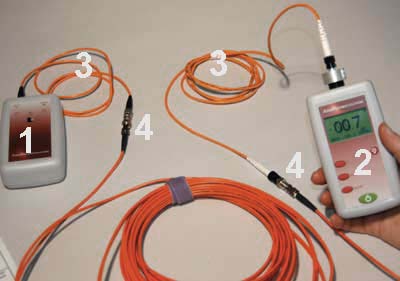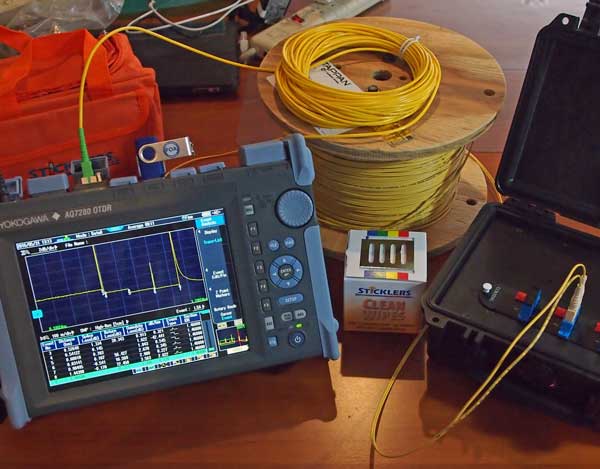Inside look at how an optical measurement system powers fiber analytics
Inside look at how an optical measurement system powers fiber analytics
Blog Article
A Comprehensive Overview to Optical Measurement System for Fiber Analysis
When it pertains to fiber analysis, understanding optical measurement systems is vital for evaluating performance and ensuring top quality. You'll check out vital methods like interferometry and spectroscopy, which help you determine essential specifications. There's more to it than simply these methods; mastering depletion measurement methods can considerably influence your network's effectiveness. As you navigate through this guide, you'll reveal insights that can change your method to fiber optics.
Recognizing Optical Measurement Solutions
When you explore optical dimension systems, you'll uncover they're necessary for assessing fibers with accuracy. These systems utilize light to assess various characteristics of fibers, consisting of size, refractive index, and harmony. By employing strategies like interferometry and spectroscopy, you can gain important understandings into the fiber's properties.You'll locate that these systems are designed to lessen errors and boost accuracy, guaranteeing dependable data for your evaluation. Different configurations, such as single-mode and multi-mode systems, provide to certain fiber types, enabling you to pick the very best fit for your needs.Moreover, the integration of innovative software application tools assists you translate the information efficiently, making it less complicated to determine any inconsistencies or problems. As you explore much deeper right into these measurement systems, you'll appreciate exactly how they streamline the analytical procedure and improve the overall quality of fiber manufacturing and screening.
Secret Criteria for Fiber Evaluation
Key specifications for fiber analysis play an important role in identifying the quality and efficiency of optical fibers. When you review a fiber, you'll intend to concentrate on features such as depletion, data transfer, and modal diffusion. Depletion gauges the loss of signal strength as light travels via the fiber. A lower attenuation worth indicates better quality and longer transmission distances - fibre testing equipment.Bandwidth describes the data-carrying ability of the fiber and is essential for high-speed interaction. You'll need to assess the bandwidth to ensure it fulfills your application needs. Modal dispersion, which develops from the various speeds at which light journeys through numerous modes in multimode fibers, influences signal clarity
Methods for Depletion Measurement

Data transfer and Its Effect On Efficiency
Comprehending transmission capacity is vital for enhancing fiber performance, as it straight affects the quantity of data that can be transmitted over a network. Greater bandwidth implies you can send out even more info concurrently, permitting faster communication and better general efficiency. When you're collaborating with fiber optics, it's vital to think about just how bandwidth connects with fiber attributes, such as core dimension and material properties.If the bandwidth is limited, you might experience data loss or slower speeds, impacting your applications. Furthermore, different sorts of fibers can support differing transmission capacity degrees, so it's essential to choose the ideal fiber for your certain needs.You ought to additionally keep in mind that ecological variables, like temperature level and outside disturbance, can influence transmission capacity. By comprehending these aspects, you can make educated decisions to boost your fiber optic systems, guaranteeing dependable and efficient data transmission.
Refractive Index Measurement Methods

Overall Inner Reflection
Overall interior representation (TIR) serves as an essential principle for determining the refractive index of fibers. When light journeys from a denser tool to a much less thick one, it can only be completely reflected if the angle of occurrence exceeds a specific threshold, recognized as the crucial angle. This phenomenon allows you to identify the refractive index by assessing the angles at which light mirrors or refracts. By making use of a configuration that routes light into a fiber and determines the resulting angles, you can compute the refractive index properly. Understanding TIR not just improves your fiber evaluation however also improves the layout and efficiency of optical systems. So, leveraging TIR can lead to more reliable fiber-based applications.
Interferometric Methods
Building on the concepts of overall inner reflection, interferometric techniques provide a powerful ways for determining the refractive index of fibers with high accuracy. These methods manipulate the interference patterns created when light beams split and recombine after taking a trip various courses. You can use configurations like the Michelson or Mach-Zehnder interferometer to examine phase shifts created by modifications in refractive index. By thoroughly calibrating your system and evaluating the resulting edges, you can determine the refractive index with impressive accuracy. It's essential to preserve steady ecological conditions to decrease errors. With these methods, you'll enhance your understanding of fiber properties, causing much better performance in numerous applications, from telecoms to sensor modern technology.
Modal Diffusion and Its Relevance
Modal diffusion refers to the spreading of light pulses as they travel via a fiber, which can impact the overall efficiency of the system. You'll see that this sensation can bring about indicate distortion, affecting data transmission rates and quality. Recognizing its value is essential for optimizing fiber optic styles.
Definition of Modal Diffusion
In fiber optics communications, modal dispersion plays a considerable duty in identifying signal quality and transmission rate. It happens when different light settings travel at varying rates with the fiber. Considering that each mode has unique paths and features, they can show up at the getting end at different times. This time distinction can bring about signal dispersing and distortion, which can deteriorate the overall performance of the interaction system. You could run into modal diffusion mostly in multimode fibers, where the multiple courses of light exacerbate the problem. Understanding modal dispersion is important for maximizing fiber styles and making sure that your communication systems run effectively, preserving the honesty of the transmitted signals over longer distances.
Effects on Fiber Performance
Recognizing modal diffusion helps highlight its results on fiber performance. This sensation occurs when various settings of light travel at varying rates within the fiber, leading to indicate spreading gradually. As you examine fiber optics, you'll discover that increased modal diffusion can considerably degrade signal quality, resulting in reduced bandwidth and longer transmission distances. In useful terms, this indicates your data can arrive distorted or delayed, impacting general communication efficiency. To minimize these results, you could think about utilizing single-mode fibers, which decrease modal diffusion. By picking the appropriate fiber kind and understanding exactly how modal diffusion influences performance, you can boost transmission top quality and warranty trusted data transfer in your optical dimension systems.
Tools and Technologies for Optical Measurements
When it comes to optical dimensions, numerous innovative tools and modern technologies go to your disposal to boost fiber evaluation. You'll discover fiber optic testers, which examine signal useful content high quality and efficiency, important for preserving excellent network performance. Optical time-domain reflectometers (OTDRs) are crucial for locating mistakes and measuring loss over ranges, supplying comprehensive understandings right into fiber integrity. Additionally, spectrometers can examine light ranges, helping you determine material homes and composition.Don' t forget the importance of imaging systems, like electronic microscopic lens, that enable you to aesthetically check fiber surfaces for defects. Additionally, think about using polarization analyzers to gauge anxiety and strain in fibers, which is essential for recognizing their habits under numerous problems. By leveraging these tools and modern technologies, you can considerably improve your fiber evaluation procedures, making sure reliability and high efficiency in your optical networks.
Regularly Asked Concerns
What Are the Prices Connected With Optical Measurement Equipments?
The costs connected with optical measurement systems can vary substantially. You'll need to review equipment costs, upkeep fees, software program licenses, and potential training expenses. Budgeting very carefully will help you prevent unanticipated financial difficulties down the line.

Exactly How Commonly Should Fiber Evaluation Be Done?
You must execute fiber evaluation consistently, commonly every 6 months or after substantial adjustments in the atmosphere (optical measurement helpful site system). This ensures suitable performance and helps identify potential concerns prior to they affect your system's efficiency and reliability
Can Optical Measurement Equipments Be Adjusted in your home?
Yes, you can calibrate optical dimension systems in the house, however it requires accuracy. Make particular you comply with the manufacturer's standards, utilize suitable calibration standards, and ascertain your results to guarantee precision in official site your measurements.
What Industries Commonly Make Use Of Optical Measurement Solutions?
You'll locate optical dimension systems widely made use of in markets such as telecoms, manufacturing, medical care, and research. They're crucial for quality assurance, fiber analysis, and making certain precise dimensions in different applications, enhancing efficiency and precision throughout markets.
Are There Any Type Of Security Problems With Optical Measurement Solutions?
Yes, there are safety and security interest in optical measurement systems. You ought to constantly wear safety eyewear to protect your eyes from extreme source of lights and warranty proper training to manage equipment safely and stay clear of accidents.
Report this page